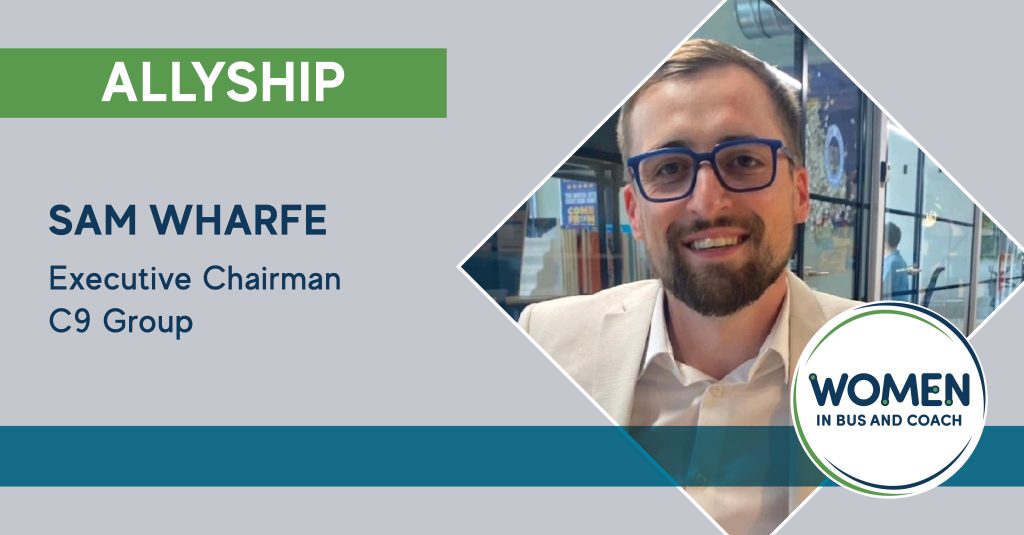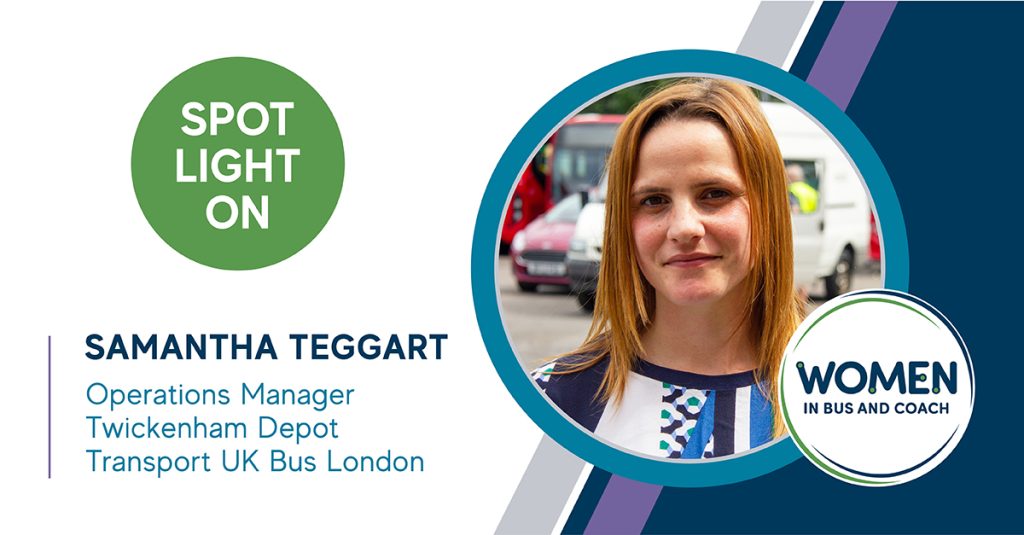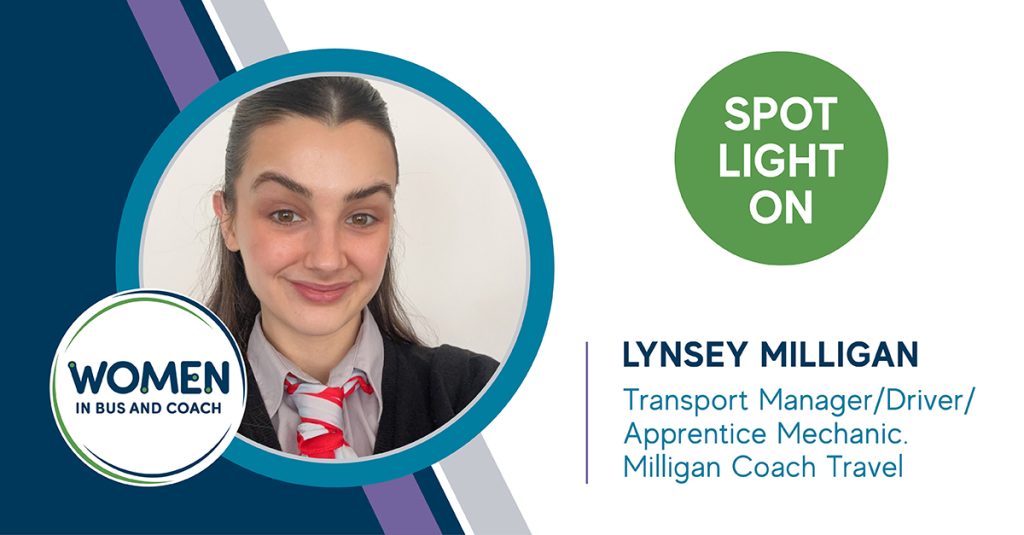Our Allyship initiative recognises individuals who have been allies in supporting and encouraging Women across the bus, coach, and community transport sector. Individuals who have contributed significantly to the professional growth and empowerment of women, whether through mentorship, advocacy, or creating opportunities for women to thrive, these allies have played a crucial role in promoting gender equality and diversity in our sector.
This initiative aims to encourage everyone to be allies, with the individuals featured sharing insights into their own professional career background, their ally approach, as well as providing suggestions and advice on how we all can be allies.
Today we hear from and learn about:
Sam Wharfe FRCA, FCILT
Executive Chairman
C9 Recruitment
How did you get to where you are today?
I “left” a couple of schools very young (aged 12) and had no GCSEs. I briefly went to college but didn’t last long, I was far more interested in technology, building products, and finding creative ways to bypass systems (much to the frustration of the school IT teams!).
I moved into an IT apprenticeship which, truth be told, I never formally finished – but I managed pass anyway, whoops. At the time, I was earning £400 a month as an apprentice, had my first child at 16, and had already moved into my own flat with very little support around me, so growing up was tough! However, built a lot of resilience. It takes a lot to stress me out and despite anything going on in life you’ll often see me laughing away in person!
Fast forward, I spent over a decade as a technical architect for large enterprises in aviation, pharma, insurance, banking, and transport – building systems that streamlined operations and improved people’s working lives.
I even turned down a certain technical role with a certain government organisation that cannot be named at 20 years old because I wanted to create a positive impact on a larger, more public scale, not behind the scenes…
I never came from a recruitment background, so when I entered the sector I brought a fresh perspective. I saw a gap for a modern, ethical, people-first recruitment model in the bus and coach sector. Using my technical expertise and industry connections, I founded C9 Recruitment (accidently).
In just a short span, we grew, and are still growing, into the most respected names in the industry – known for innovation, compliance, and putting people at the heart of what we do.
C9 began life as Cloud9 IT, I had staff working on large enterprise projects providing tech automation and much more, and I fell into the agency world by accident.
That “accident” has opened the door to not just recruitment but a deep understanding of the transport sector as a whole.
I’ve been quietly working with a team of developers behind the scenes on technology that will help innovate and positively disrupt the sector far beyond recruitment, on a national scale – and those products are about to launch.
Watch this space.
Did you experience any challenges getting to where you are today?
Yes – plenty, and thy don’t stop, and won’t stop, it’s about how you overcome the challenges and come out stronger every day. Resilience is the key.
The sector can be very traditional, and coming in with a fresh, technology-driven, people-first approach was always going to ruffle a few feathers, is that challenging, or just fun?
Challenging the status quo meant I had to prove myself twice over – once as an industry outsider, particularly as I entered with a business that most people dislike due to poor reputations in the traditional agency market, again, purposely, I love a challenge and building such a positive reputation across a market as an agency was the most enjoyable yet challenging route to go down, and again as someone determined to do things differently was a challenge but also enjoyable.
There were moments that could have broken us. One of the hardest was a major client liquidation from an operator that left me with a circa £500,000 loss almost overnight. That wasn’t just numbers on a spreadsheet – it was payroll to cover, livelihoods at stake, and the weight of knowing my team and their families were counting on me to find a way through.
At the same time, I was contending with the perception some still hold that recruitment is purely transactional, when for me it’s always been about relationships, trust, and building people up.
I overcame those challenges by doubling down on our values, believing in my own vision, believing I can execute, and not being knocked down, being transparent with my team, and refusing to compromise on quality or ethics, even when the easy option would have been to cut corners like some other agencies do.
We innovated, we tightened our processes, and we pulled together as a team. Those experiences taught me that resilience isn’t about avoiding problems – it’s about how you show up when they hit and bat them out the park. Nowadays, we laugh about that situation.
All part of life’s journey!
And in our case, we came out stronger, more united, and more determined than ever to set a higher standard for the industry.
If so, how did you overcome them?
By focusing on people first – always.
Challenges are inevitable, but I’ve learned that the way you respond can either close doors or open them. I make it a priority to lead with empathy, to really listen, and to create opportunities for others, especially for women whose voices might not always be heard in a traditional sector.
I’ve stayed true to my values by being consistent in my actions, keeping promises, and building genuine relationships based on trust. I believe allyship isn’t just about supporting someone when it’s easy – it’s about showing up when it’s hard, championing their ideas in the rooms they’re not sometimes in (yet should be!), and making sure they feel seen, valued, and respected.
I also surround myself with a diverse network of trusted allies whose perspectives challenge me to think differently.
Those relationships have been invaluable in helping me grow as a leader and in ensuring that my decisions are inclusive and future-focused.
What do you like about the sector?
I love that the bus and coach sector is, at its heart, about people and connections, moving people to where they need to be, connecting communities, and keeping the country moving. That sense of purpose is something special.
It’s also a sector full of incredibly passionate, skilled people, many of whom have dedicated their entire careers to it – yet it’s still evolving and work needs to be done to empower under-represented groups.
I enjoy being part of that change, challenging “how it’s always been done,” (Never say this in front of me… Ha), and helping create space for fresh perspectives, particularly from women who bring new ideas, lived experience, and leadership styles the sector needs more of.
For me, the most rewarding part is seeing someone grow into a role they didn’t think they could do, or watching their confidence increase because they finally feel included and supported. Whether that’s through recruitment, mentoring, or making introductions, those moments are what make the hard work worth it.
My way of mentoring is not to tell people what to do, but to plant the right seeds to make my mentees work out the right answers themselves, and if they do go too far in the wrong direction, pull them back into the right direction.
And finally – I like the fact that it’s an industry that welcomes personality.
Yes, it’s serious work, but there’s space for humour, humanity, and building real relationships.
That mix of purpose, people, and possibility is why I love being here.
What does a typical day look like?
Imagine juggling a board meeting, a coding sprint, a charity fundraiser, a mentoring session, and a toddler tea party, all while running between rooms like you’ve had 20 espressos too many.
That’s pretty much my day, every day.
I can go from speaking with MPs about hospice funding to debugging an advanced technology stack integration, to ensuring we C9 Recruitment are covering shifts and always steaming ahead, to soldering components for a robotics project, to mentoring a woman stepping into leadership – all before breakfast.
And at some point, I’ll be in my AI lab at home, surrounded by humming Threadrippers and advanced hardware, training models that may or may not take over my coffee machine… Or just robotic autonomous swarms of AI spiders for fun.
In between, I’m making introductions – I collect people the way others collect vinyl. Unwell patient needs a specialist? Sorted. Young student needs a break into the sector? Done. Someone’s been overlooked for a role? I’ll kick the door open for them.
Why? Because why not.
It’s chaos, but it’s purposeful chaos. I like it that way.
It means I can spend my life building things – businesses, technology, opportunities – that help others build theirs.
Whether it’s in the bus and coach sector, charity work, or the tech space, my goal’s the same: leave people more connected, more confident, and more empowered than they were when I found them, and I have proven that time and time again with all the work I do behind the scenes.
Why does the sector need allies and how do you bring this into your role?
Because the sector can’t evolve if the same voices keep making all the decisions.
We need allies – especially men in senior roles, who will use their influence to open doors, challenge bias, and actively make space for women to step into roles where their talent belongs and is highly needed.
Allyship isn’t just being “supportive” when it’s convenient.
It’s championing someone’s ideas in the rooms they’re not yet in, giving credit publicly, and making sure opportunities are shared fairly. It’s having uncomfortable conversations when needed, and never letting “that’s how we’ve always done it” be the reason we don’t change.
In my own role, I’ve mentored women at different stages of their careers, connected them with industry leaders, brought them onto panels, and sponsored initiatives that showcase their skills.
I’ve challenged hiring decisions when I felt someone was being overlooked, and I’ve helped build tech that strips bias out of recruitment processes altogether.
I see my role as an amplifier and a connector – someone who can spot potential, then get it in front of the right audience.
And I do it because when the sector truly reflects the communities it serves, it becomes stronger, smarter, and more resilient for everyone.
Why is diversity important?
Because without diversity, we design an industry for a fraction of the people it serves.
The bus and coach sector moves communities, and those communities are diverse in gender, culture, background, and experience.
If the teams shaping policy, running operations, and leading innovation don’t reflect that diversity, we end up with blind spots that hurt service, safety, and growth.
Diversity isn’t a “nice to have”, it’s a competitive advantage.
Different perspectives challenge stale thinking, bring new ideas to the table, and create workplaces where more people can thrive.
When women are in leadership positions, when people from underrepresented backgrounds have a voice, the whole sector benefits from better decision-making and stronger teams.
What changes have you made in your role to support women and to encourage more women into the bus and coach sector?
Mentoring & Sponsorship:
I’ve personally mentored women in the sector, helping them navigate career progression and connecting them directly to decision-makers who can fast-track opportunities.
Representation:
I actively nominate and recommend women for panel spots, industry events, and leadership positions.
Bias-Free Recruitment:
We’ve built recruitment processes and tech that strip out unconscious bias and focus purely on capability and potential.
Flexible Working:
I’ve championed flexibility in roles where possible, making the sector more accessible for women with family or caring responsibilities.
Visibility & Celebration:
I sponsor and support events, awards, and initiatives that spotlight the achievements of women in bus and coach, making sure their stories are heard.
What advice when you give to other men in the bus, coach and community transport sector to be a supportive ally?
Listen more than you speak. Don’t assume you know someone’s experience – ask, and really hear the answer.
Champion women when they’re not in the room. Recommendations made behind closed doors are often the most powerful.
Share the stage. If you’re asked to speak on a panel, bring someone with you who hasn’t had that opportunity before.
Call out bias. Silence reinforces the problem. If you hear or see something that’s off, challenge it.
Invest your time. Allyship isn’t a once-a-year LinkedIn post – it’s showing up consistently is key.
What could the sector do collectively together to change for the better?
Create structured mentoring and sponsorship programmes pairing emerging talent with experienced leaders.
Set measurable diversity targets and hold ourselves publicly accountable.
Offer flexible entry routes into the sector – apprenticeships, return-to-work schemes, and leadership training tailored for women and underrepresented groups.
Normalise flexible working where operationally possible, so more women can see a long-term future in the sector, and be able to RETAIN women, not just market it and then don’t execute on what you have said.
Celebrate success stories visibly and often, so young women can see role models in every part of the industry.
Anything else you would like to share?
I’ve been lucky enough to meet and work with some of the most inspiring women in transport – and my role as an ally is simple: clear barriers, open doors, and amplify voices.
I don’t believe in ticking boxes for the sake of it. I believe in building an industry where the best ideas win, and where everyone has a fair shot at bringing those ideas to life.
And if I can do all that while also running businesses, raising many, many kids, tinkering with AI robots, and occasionally winning the “Worst Golfer” award as well as “Worst Bus Driver”… then I think we can all agree there’s no excuse not to make the time.
Thank you for sharing your story Sam and thank you for being an ally and your support of Women in Bus and Coach.
To find out more about who Sam works for and career opportunities visit: https://c9-recruitment.com/candidates


